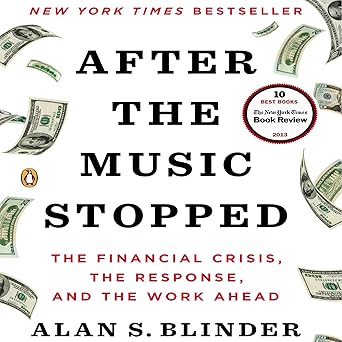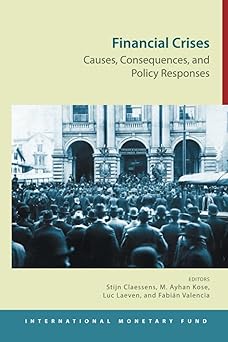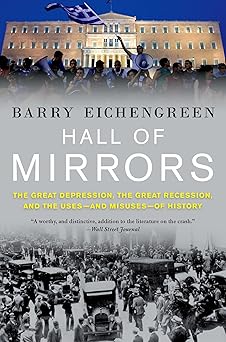It’s easy to feel powerless when the news is full of economic uncertainty. I remember feeling that way during the 2008 financial crisis. I was young, just starting my career, and watching the world seemingly crumble around me was incredibly unsettling. It felt like the ground beneath my feet had vanished. I worried about my job, my family's security, and the future in general. I wasn’t alone; so many people felt that same sense of fear and helplessness.
Over the years, I’m often asked how to navigate difficult times, and I’ve realized that understanding what happened – and why – can be a powerful tool. Knowledge isn’t a magic bullet, but it does give you a sense of control. It allows you to look at the world with a bit more clarity, and to make informed decisions, even when things feel chaotic. That’s why I’ve curated this list of books. They delve into the economic downturns that have shaped our world, helping us understand the patterns, the mistakes, and the potential paths forward. Let's dive in and learn together.
The Federal Reserve and the Financial Crisis

I still remember the day I first learned about the importance of the Federal Reserve in maintaining the stability of our economy. It was a turning point for me, and I knew that I had to understand more about how it works. That's when I stumbled upon this book, and I must say, it's a game-changer. The author, Ben Bernanke, takes us on a journey through the history of the Federal Reserve, from its inception in 1914 to the recent financial crisis. He reveals the inner workings of the central bank, sharing his personal experiences and insights into the key decisions that were made during the crisis. It's fascinating to learn about the challenges that Bernanke and his team faced, and how they worked to inject liquidity into the banking system. What struck me most was Bernanke's emphasis on the limitations of monetary policies in reviving an economy, and the ongoing structural problems that need to be addressed. He points out that the Fed's role as the lender of last resort is crucial, but it's not enough to solve the problem on its own. I found it incredibly relatable, especially when thinking about my own experiences with financial planning and the importance of understanding the Federal Reserve. This book is a must-read for anyone looking to understand the inner workings of the Federal Reserve and its role in shaping our economy.
Discover this book on Amazon (affiliate link)
After the Music Stopped: The Financial Crisis, the Response, and the Work Ahead

This book is a powerful and insightful look at the 2007-2008 financial crisis, told through the eyes of one of America's most respected economists. The author, a former vice chairman of the Federal Reserve Board, masterfully weaves together a narrative that is both comprehensive and easy to follow. He begins by explaining the perfect storm of events that led to the crisis, from the bursting of the housing bubble to the implosion of the bond bubble, and shows how these events spread like wildfire throughout the interconnected global economy. As we follow the story, we can't help but think of the millions of people who were affected by the crisis - families who lost their homes, small business owners who went bankrupt, and entire communities that were left struggling to survive. The author also sheds light on the government's response to the crisis, and how it could have been done differently. What's most striking about this book is the author's empathy and understanding for those who were affected by the crisis. He writes with a clear and bracing clarity, making the book an essential read for anyone looking to understand the crisis and how we can work towards recovery. The author's own experiences on Wall Street and in the Federal Reserve give the book a level of credibility and depth that is hard to find elsewhere. As someone who has always been fascinated by economics, I found this book to be both a privilege and a challenge to read - a privilege because of the author's unique insights, and a challenge because of the sheer weight of the subject matter.
Discover this book on Amazon (affiliate link)
Financial Crises : Causes, Consequences, and Policy Responses

This book is a treasure trove of knowledge for anyone looking to understand the complexities of financial crises. I recall hosting a book club discussion with a group of finance professionals, and the room was filled with curiosity and concern as we delved into the world of financial crises. The book takes us on a journey to unravel the causes, consequences, and policy responses to these crises, making it a comprehensive resource for anyone seeking to grasp the intricacies of the global economy. The author masterfully weaves together a wide range of crises, including banking, balance of payments, and sovereign debt crises, to provide a rich tapestry of insights. By introducing a comprehensive database of crises, the book sets the stage for a thorough analysis of crisis prevention and management. The author shares broad lessons on how to prevent crises, mitigate their effects, and even analyze the short-term economic effects of recessions and recoveries. Additionally, the book explores the medium-term effects of financial crises on economic growth and provides valuable policy measures to prevent booms, busts, and crises. What struck me most was the book's emphasis on restructuring banks, households, and sovereigns to mitigate the adverse impact of crises. This book has been an invaluable resource for my book club, and I'm confident it will be for anyone who seeks to deepen their understanding of the complex world of finance.
Discover this book on Amazon (affiliate link)
The Great Trade Collapse: Causes, Consequences and Prospects

The Great Trade Collapse: A Devastating Blow to the Global Economy
In the late summer of 2008, the world witnessed a catastrophic event that would change the course of global trade forever. The news of Lehman Brothers' bankruptcy sent shockwaves across the globe, eroding confidence in the financial markets and plunging the world into a trade collapse. The effects were swift, severe, and synchronized, far more drastic than during the Great Depression or the oil-price hikes of the 1970s. More than 100 nations, all tracked by the WTO, were severely impacted by this sudden and unprecedented collapse. The consequences were multifaceted, with trade volumes plummeting, and economic output suffering greatly. The authors of this book, a compilation of renowned economists, delves into the causes, consequences, and prospects of this catastrophic event, offering valuable insights that continue to shape the trade community's understanding of this pivotal moment in economic history. The book's examination of the Great Trade Collapse serves as a testament to the importance of understanding the complex dynamics of global trade and the far-reaching consequences of economic downturns, a lesson that remains relevant even years after the event.
Discover this book on Amazon (affiliate link)
Hall of Mirrors: The Great Depression, the Great Recession, and the Uses-and Misuses-of History

Reading about the Great Depression and the Great Recession can be a sobering experience, as it reminds us of the fragility of our economic systems and the devastating consequences of policymakers' decisions. I recall a conversation I had with an elderly person who had lived through the Great Depression, and it was a heart-wrenching experience for me. The widespread poverty, the loss of homes, the lack of opportunities - it was as if the world had come to a standstill. The question that kept haunting me was why we didn't learn from the past, why we repeated the same mistakes and suffered the same consequences. Barry Eichengreen's book, Hall of Mirrors, attempts to provide an answer to this question. By alternating between the two crises and comparing the responses of North America and Europe, Eichengreen sheds light on the fear of another Depression, the role of bank failures, public spending, and the shadow banking system. He shows how policymakers, in an effort to prevent another collapse, moved too quickly to strengthen troubled banks, but missed problems in the shadow banking system. They also overpromised and failed to deliver, leading to a backlash against activist governments and central banks. The result is a slow recovery in the US and an endless recession in Europe. What I find remarkable about Hall of Mirrors is how it highlights the same mistakes being repeated, the same lessons being overlooked. Eichengreen's book is not just a work of economic history, but an essential exploration of how we can learn from the past to build a better future.
Discover this book on Amazon (affiliate link)